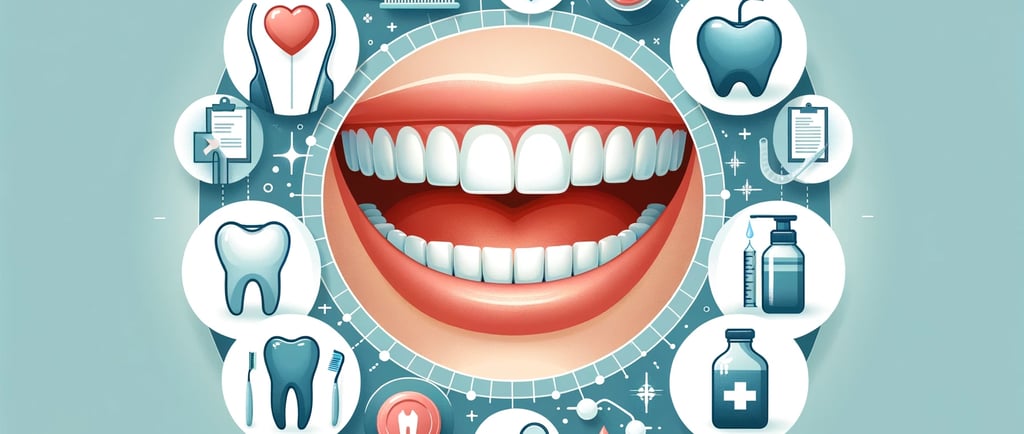How to Regrow Receding Gums
Understanding Gum Recession
HEALTH


How to Regrow Receding Gums
Receding gums, also known as gingival recession, can be a troubling dental issue that affects both the appearance of your smile and the health of your teeth. When gums recede, they pull away from the teeth, exposing the roots and making them more vulnerable to decay, infection, and sensitivity. While receding gums cannot completely grow back, there are several ways to manage the condition, promote gum health, and potentially restore some gum tissue.
Understanding Gum Recession
Gum recession occurs for various reasons, including:
Periodontal Disease: Infections of the gums that destroy gum tissue and supporting bone.
Aggressive Brushing: Brushing teeth too hard can wear away gum tissue.
Poor Oral Hygiene: Inadequate brushing and flossing can lead to plaque buildup, which can cause gums to recede.
Genetics: Some people are more susceptible to gum disease and recession due to their genetic makeup.
Hormonal Changes: Fluctuations in hormones, especially in women, can make gums more sensitive and prone to recession.
Tobacco Use: Smoking or chewing tobacco can cause gums to recede.
Teeth Grinding and Clenching: Excessive force on teeth can cause gums to recede.
Misaligned Teeth: Improper alignment can place too much force on the gums and bone.
Steps to Manage and Improve Gum Health
Practice Good Oral Hygiene
Gentle Brushing: Use a soft-bristled toothbrush and gentle, circular motions to brush your teeth. Avoid aggressive brushing.
Floss Daily: Flossing helps remove plaque and food particles from between teeth and below the gumline.
Use Mouthwash: Antimicrobial mouthwashes can help reduce bacteria in the mouth.
Regular Dental Visits
Professional Cleanings: Regular dental cleanings can help remove plaque and tartar that you may miss with brushing and flossing.
Check-Ups: Regular check-ups allow your dentist to monitor your gum health and catch any issues early.
Address Underlying Issues
Treat Periodontal Disease: If you have gum disease, your dentist may recommend scaling and root planing (deep cleaning) to remove plaque and tartar from below the gumline.
Correct Misalignment: Orthodontic treatments can help realign teeth and reduce the pressure on gums.
Healthy Lifestyle Choices
Quit Smoking: Tobacco use can exacerbate gum recession. Quitting smoking can improve gum health.
Balanced Diet: A diet rich in vitamins and minerals, especially vitamin C, can promote gum health. Include plenty of fruits, vegetables, and whole grains.
Use Specialized Dental Products
Desensitizing Toothpaste: For those with sensitive teeth due to exposed roots, desensitizing toothpaste can help.
Antibacterial Toothpaste: Toothpaste with antibacterial properties can help control plaque and prevent gum disease.
Natural Remedies
Oil Pulling: Swishing coconut oil or sesame oil in your mouth for 10-15 minutes can help reduce bacteria and improve gum health.
Saltwater Rinse: Rinsing your mouth with a solution of salt and warm water can reduce inflammation and bacteria.
Surgical Options
Gum Grafting: In severe cases, a periodontist may recommend gum grafting, where tissue is taken from another part of your mouth and attached to the receding area.
Pinhole Surgical Technique: A minimally invasive procedure that involves making small holes in the gum tissue to reposition it over the exposed roots.
Preventing Further Gum Recession
Use Proper Brushing Techniques: Always use a soft-bristled toothbrush and gentle pressure.
Wear a Mouthguard: If you grind or clench your teeth, wearing a mouthguard at night can protect your gums.
Avoid Tobacco Products: Eliminating tobacco use can significantly improve gum health.
Monitor Hormonal Changes: For women, being aware of hormonal changes and how they affect gum health can help in taking preventive measures.
Conclusion
While receding gums cannot completely grow back, taking proactive steps to manage the condition can improve gum health and potentially restore some gum tissue. Good oral hygiene, regular dental visits, addressing underlying issues, and considering natural remedies or surgical options can all contribute to healthier gums. By maintaining a healthy lifestyle and being mindful of your dental care routine, you can prevent further gum recession and protect your teeth.



